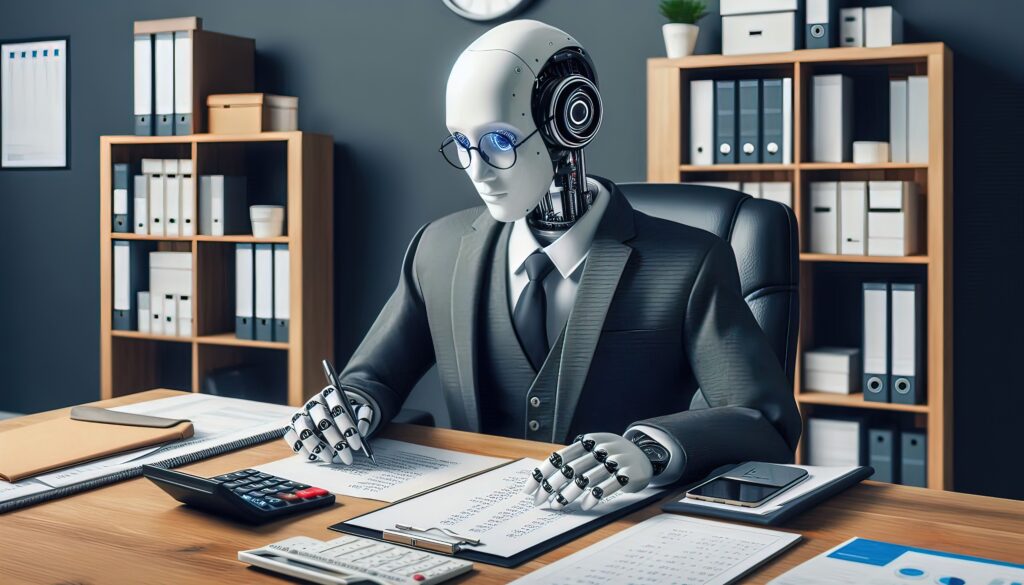How AI is Transforming Accounting Practices

Artificial Intelligence (AI) is no longer a futuristic concept, it is actively reshaping the landscape of accounting. As an expert accounting firm, we are observing firsthand how AI is not just enhancing productivity but also redefining traditional workflows, roles, and expectations in the profession.
This article offers a detailed, objective view of the ways AI is influencing accounting practices today and what firms and professionals should anticipate going forward.
Automation of Routine Tasks
One of the most immediate and visible impacts of AI in accounting is the automation of routine tasks. Activities such as data entry, bank reconciliations, invoice processing, and expense categorization can now be handled more quickly and accurately by AI-powered software.
Machine learning algorithms can extract and process data from receipts, PDFs, and scanned documents, eliminating the need for manual input. These systems learn over time, improving in accuracy and reducing the likelihood of errors. As a result, accountants are spending less time on clerical tasks and more on higher-value activities.
Enhanced Accuracy and Reduced Risk
AI systems are highly effective at detecting anomalies, flagging inconsistencies, and ensuring compliance. In audit processes, AI tools can scan through massive datasets and identify transactions that deviate from expected patterns. This allows auditors to focus on analyzing potential risks rather than being buried in the data.
Similarly, predictive analytics can be used to assess the likelihood of fraud or financial misstatements. By leveraging AI, firms can proactively manage risk, rather than reacting after issues arise. This also helps in meeting the growing regulatory demands that require real-time or near-real-time reporting and analysis.
Real-Time Financial Insights and Forecasting
Traditional accounting often works in retrospective cycles, i.e. monthly closes, quarterly reports, and year-end audits. AI changes this model by enabling continuous accounting. Real-time data ingestion and analysis provide up-to-the-minute financial insights.
Furthermore, AI-powered forecasting tools use historical and current data to predict future trends, such as cash flow projections, revenue performance, and cost analysis. This empowers both accountants and clients to make informed decisions faster and with greater confidence.
Transformation of the Accountant’s Role
As AI handles more of the technical and repetitive work, the role of the accountant is shifting toward that of a strategic advisor. Skills in data interpretation, critical thinking, and business acumen are becoming more valuable than rote computational abilities.
Accountants are now expected to explain insights derived from AI tools, guide clients through complex financial scenarios, and align financial strategies with broader business goals. In this new paradigm, emotional intelligence, communication skills, and adaptability are as crucial as technical proficiency.
Ethical and Compliance Considerations
AI in accounting also raises important ethical and compliance issues. Algorithms must be transparent, unbiased, and auditable. There is a risk of over-reliance on automated systems that may lack the nuanced understanding a human brings to certain judgments.
Additionally, data privacy is paramount. With AI systems handling large volumes of sensitive financial data, firms must ensure robust cybersecurity and compliance with data protection regulations such as GDPR or CCPA.
Auditors and regulatory bodies are also exploring how AI-driven processes can be audited themselves. The concept of “audit of the AI” is emerging as a new domain requiring guidance and best practices.
Integration and Skills Development
Integrating AI into existing accounting systems is not a plug-and-play solution. It requires thoughtful planning, training, and change management. Firms must assess which processes are best suited for AI enhancement and invest in upskilling their workforce.
This includes not only technical training but also fostering a culture that embraces innovation. CPAs and accounting professionals will need to become familiar with AI tools, understand their limitations, and learn how to leverage them effectively.
AI and Accounting in 2025 and Beyond
AI is undeniably transforming accounting practices, from routine task automation to strategic decision support. While the technology offers significant benefits in efficiency and insight, it also demands careful integration and ongoing oversight.
The future of accounting will not be defined by machines replacing humans, but by humans and AI working together to deliver smarter, faster, and more strategic financial services. Accounting professionals who understand and adapt to these changes will be well-positioned in the evolving landscape.
